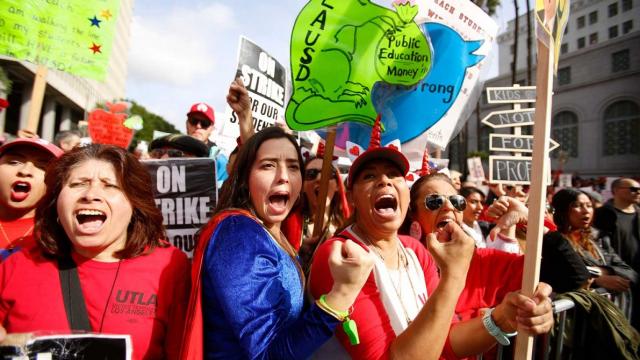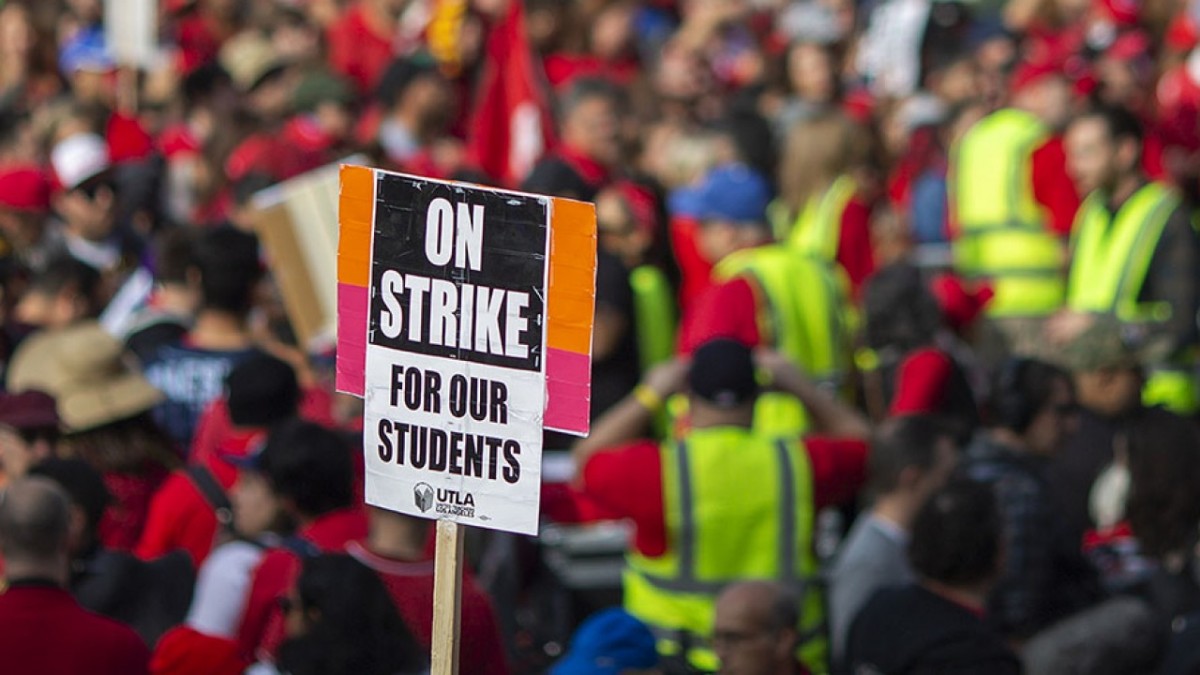
The recently concluded teachers strike in Los Angeles has given a huge boost to organized labor and signaled growing resistance to austerity and neoliberal economic orthodoxy.
Although the strike was unique in many respects, it must be seen in the context of larger trends nationwide. The big win realized by the L.A. teachers and their union will not only impact statewide budget considerations in California. It will encourage other teachers and workers everywhere to fight for their rights.
Background to the strike
To the average news consumer, the strike may have appeared to have come out of nowhere. But it was long in coming. As told by Sarah Jaffe in The Nation, the teachers’ union, the United Teachers of Los Angles (UTLA), has been energetically organizing since 2014 when a more activist faction won elections on the platform of building the union’s power in order to take on the austerity imposed by the L.A. Unified School District (LAUSD).
The new UTLA team, headed by Alex Caputo-Pearl, recognized from the beginning that a strike could well be necessary to force the school board and city to reverse the decline in resources going to L.A. schools. A few decades ago, California was at or near the top in terms of the amount of spending per student.
But starting in 1978 with Proposition 13, which significantly reduced property taxes, California’s commitments to education began to slide precipitously. The state is now in 43rd place in the United States in per student funding.
As spending on public schools decreased, a well-financed charter school movement began to compete for resources and students, further draining public school spending. The logical result was stagnation in teacher compensation at a time when the cost of living in the state’s metropolitan areas was skyrocketing.
As was the case in the teacher strikes last year in West Virginia, Nevada, Oklahoma and Kentucky, many of L.A.’s teachers can no longer afford to live anywhere close to the schools where they teach, and many take second jobs to make ends meet. The schools themselves are increasingly inadequate with growing class sizes and shrinking services, such as those provided by school nurses, librarians and counselors.
What is most impressive about UTLA’s organizing is that it had to engage with teachers across the very large geographic area that is Los Angeles. In order to do this, the leadership created strong channels of two-way communication, building a democratic union and empowering teachers across the sprawling district.
In addition, it strengthened relationships between teachers and the families they serve, relationships that Jaffe observed numerous times in her on-the-ground reporting during the strike. Parents and students stood with the teachers, knowing that the strike was about much more than teacher compensation. They knew that the teachers were fighting for them.
UTLA steadily built toward a strike, getting 98 percent approval from the teachers back in September 2018 as it continued to negotiate with the school board. A potential strike was the main topic of the October 2018 UTLA newsletter, which asked the following five questions of its readers in order to ensure that their school was “strike ready”:
-
Has all of your staff signed the "We Will Strike If We Have To" commitment form?
-
Are you and your colleagues wearing "Ask Me Why I Am Ready to Strike" buttons every day?
-
Are you signing people on to the Parent Support list? to invite parents to local meetings and calls to action?
-
Is your school holding community walks to pass out "We Stand With LA Teachers" and "We Stand With LA Educators" signs?
-
Have you talked to institutions you belong to about supporting our fight?
UTLA’s stunning win
The agreement with L.A. Union School District and the city represented an overwhelming victory for UTLA and L.A.’s teachers. In the settlement, the LAUSD committed to reducing class sizes, giving teachers a 6 percent pay raise over two years, providing a nurse and librarian in every school, as well as more counselors for the district and other badly needed social services.
The teachers also won a 50 percent reduction in standardized testing and an agreement by the school board to work towards a “cap” on charter schools in addition to an increase in state funding. As part of the settlement, Mayor Eric Garcetti agreed to support the Schools and Communities First ballot initiative for the 2020 elections to roll back Proposition 13 tax reductions that have done so much to deprive the state of funds for public schools.
The wide-ranging nature of the settlement was also seen in its social justice provisions that included reduced policing in schools and the end to random searches in 28 schools, as well as an immigrant defense fund to support families. Caputo-Pearl said: “This is much more than a narrow labor agreement….It’s a very broad compact around things that get at social justice, educational justice and racial justice.”
In addition to its active organizing work among the district’s 32,000 teachers over the past several years, UTLA’s victory can also be attributed to the strong relationships the teachers built and enjoyed in their communities. Many parents and students stood with teachers on the picket lines while others brought food and helped out in other ways.
At the same time, the teachers worked to make sure that kids who depend on free or reduced priced meals at school would be fed. As Jaffe noted, multiple community organizations supported the strike, including Alliance of Californians for Community Empowerment(ACCE), Students Deserve and Reclaim Our Schools.
What the win means
It is abundantly clear that the L.A. win helps to move the balance of power in California and nationally toward public education and against both austerity and the privatization of education through charter schools. The chart on the UTLA website breaks down the strike’s success in three columns: ”LAUSD’s pre-strike offer,” “What we won,” and “How it fights privatization and invests in our future.”
The union is very explicit about the aims and the result. Nationwide, especially in conjunction with the “Red4Ed” strikes of last spring, it is clearly a blow against the neoliberal agenda premised on austerity for public programs, lower taxes for corporations and privatization of government services.
In California, as in most states, education makes up a large portion of the public budget, which means that the issue of funding for public education is now squarely on the agenda of new Governor Gavin Newsom and the state legislature. The state has a budget surplus of around $30 billion, so it can afford to invest in education and it appears that the governor’s commitment to additional funding from Sacramento helped the negotiators reach a settlement.
But there are many other demands, including major commitments to decarbonizing the energy sector and providing public health insurance. All of these crucial needs highlight the importance of a much fairer tax system.
How it may spread from here
UTLA’s success is likely to encourage other teachers and workers to fight for their rights – and indeed other mobilizations are already in process. Oakland’s teachers, who have been without a contract since 2017, may be the next to walk out.
Here, too, issues of overall school funding for essential resources such as nurses, counselors and smaller class sizes stand out alongside demands for livable compensation. In Oakland, the beginning salary is $46,000 a year, which is far from livable in the astronomically overpriced Bay Area. Teachers walked out for a day on Jan. 18 and will vote to approve a strike on Jan. 29 if negotiations don’t meet their demands.
Denver teachers are also in line to strike, having voted last week to walk out in demand of higher wages and increased funding for public schools. This follows a one-day action last April when the city's teachers called for more funding for public education. But any strike might be postponed, because Colorado law allows for the state to intervene and delay an official strike for 180 days.
Likewise, in Virginia, educators are holding a lobbying day on Jan. 28 to fight for more funding for public education (Virginia ranks 42nd in the country, just above California) and higher salaries. The need for higher salaries is acute in the state because of high teacher turnover and over 1,000 job vacancies statewide.
Despite the unique challenges teachers face across the country, there is no reason to consider their struggles in isolation. Many labor unions, both public and private, are re-learning how to build power and take on management. Marriott workers from San Francisco to Boston just won a significant wage increase in December, and graduate students at several universities, including Columbia, Yale, University of North Carolina and University of Illinois, have walked out in the past year.
The federal government shutdown in recent weeks also placed the fate of suffering federal workers in the news. The shutdown's end was almost certainly brought on, in part, by increasing numbers of air traffic controllers and TSA officials who called in sick, which grounded dozens of flights along the East Coast and caused hundreds of costly delays.
On Friday, the Association of Flight Attendants weighed in. Union President Sara Nelson publicly stated that the entire air transport system was breaking down. She also indicated a willingness to engage in collective action, tweeting: “The word is Strike. It is not a bad word. We should say it, especially when our government is willing to lockout 1M Americans from work or paychecks for over a month! There are no real labor rights without exercising the right to strike.”
It might be a stretch to draw conclusions yet about the L.A. teacher strike’s influence on furloughed federal workers. But many of those workers no doubt observed, in L.A. and elsewhere, what happens when labor organizes and stands up for its rights. Nelson’s words reflect that attitude.
Workers seeing other workers rise up and take control of their destiny is empowering, even without a direct relationship between organizations. At the same time, the L.A. teachers have been very explicit about the importance of their successful strike extending far beyond Los Angeles and California. Here’s Arlene Inouye, UTLA’s lead negotiator:
“Our strike is a lesson for unions across the country: the status quo isn’t okay. It’s time to step up, to be courageous, to put yourself out on the line because working people can’t continue with the current situation of economic inequality and divisions within our communities – it’s time to rise up. People have seen that we have real power, that we can win. Now’s our day. We’re going to shine and we’re going to keep rising.”












